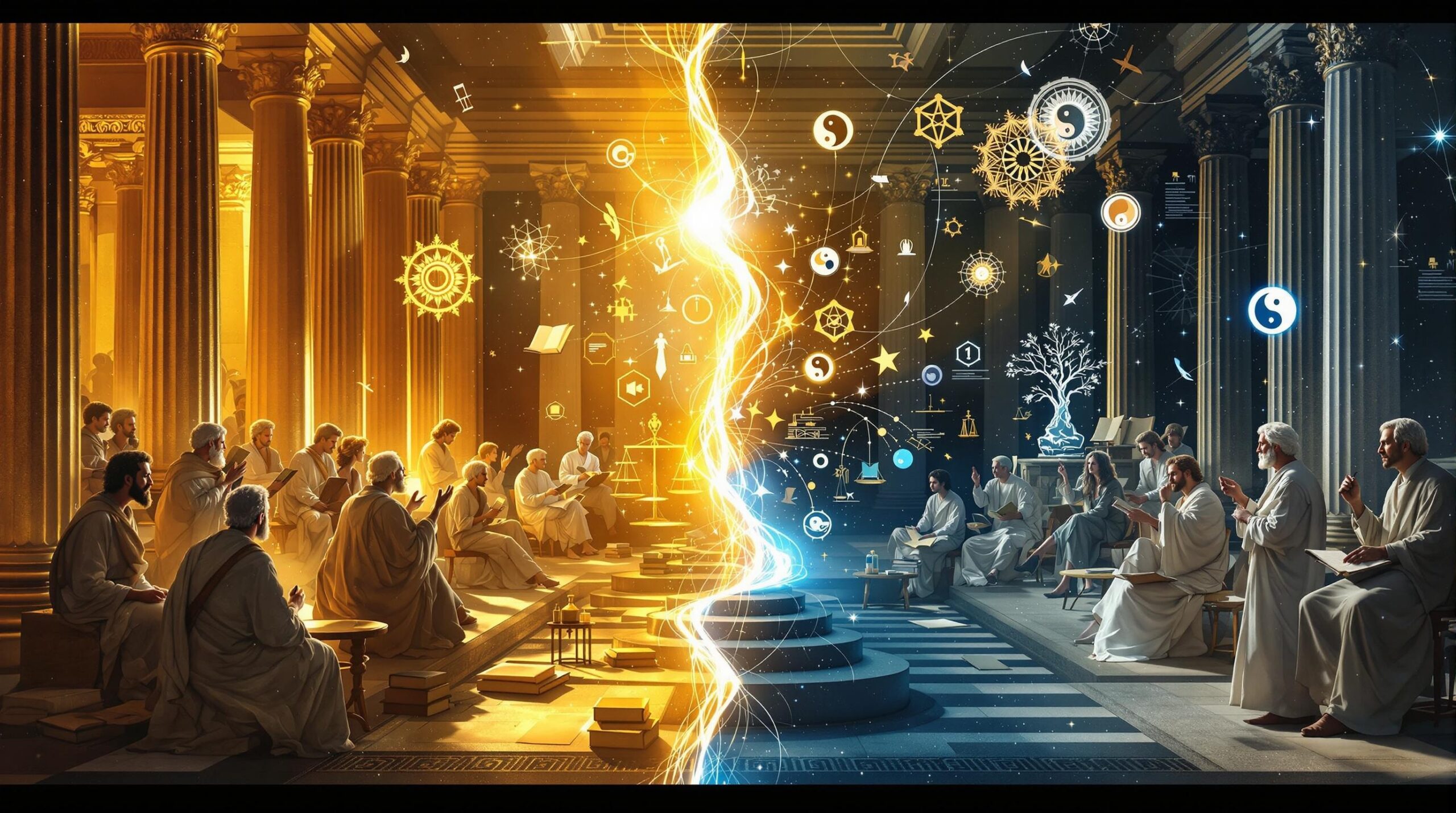Maybe you’ve wondered whether ethical principles require divine authority, or if human reason alone can ground moral life. For over 2,500 years, philosophers have developed sophisticated ethical systems independent of religious doctrine—from Aristotle’s virtue ethics in 4th century BCE to Kant’s categorical imperative in the Enlightenment. While 84% of the world’s population identifies with a religious group (Pew Research Center), over one billion people navigate moral decisions through secular worldviews, and cross-cultural research reveals universal moral intuitions about fairness and harm regardless of belief. This article traces how secular ethics developed historically, examines the philosophical foundations of morality independent of God, and explores how these frameworks apply to contemporary decision-making.
Can morality exist without God is not a question of whether people behave ethically without religious belief. It is a question of whether objective moral principles can be grounded independently of divine command.
Quick Answer: Morality can exist without God through multiple philosophical frameworks including Aristotle’s virtue ethics, Kant’s reason-based categorical imperative, and evolutionary foundations of moral intuitions. Historical evidence demonstrates that secular ethical systems based on human rationality, emotion, and social cooperation have guided moral reasoning for millennia, independent of religious doctrine.
Definition: Secular morality is an ethical system that grounds moral obligations in human reason, emotion, social cooperation, or biological evolution rather than divine command or revelation.
Key Evidence: According to research from the National Humanities Center and peer-reviewed studies in evolutionary psychology, neuroscience and evolutionary research reveal biological foundations of moral reasoning that predate organized religion, with studies showing religion “piggy-backed” on pre-existing moral precursors in human and primate social behavior.
Context: These findings suggest moral capacity evolved as a biological adaptation for social cooperation rather than exclusively as divine endowment.
Secular ethics work because they externalize abstract principles into systematic frameworks that create consistency across decisions. When leaders establish ethical commitments in advance, whether through Aristotelian virtue cultivation, Kantian universalizability tests, or utilitarian consequence analysis, they reduce cognitive load during crises and build stakeholder trust through predictable behavior. The benefit compounds over time as integrity becomes reputation, and reputation becomes competitive advantage. What follows examines how these frameworks developed historically, what biological and philosophical foundations support them, and how contemporary leaders can apply timeless wisdom to modern ethical challenges.
Key Takeaways
- Ancient secular foundations: Aristotle’s virtue ethics (4th century BCE) grounded morality in human flourishing through reason, predating Christian theology by centuries and establishing precedent for ethics based on observable human nature.
- Reason-based ethics: Kant’s categorical imperative established moral obligations through logical consistency alone, requiring no divine authority and providing universalizable principles for decision-making across diverse contexts.
- Biological origins: Cross-cultural studies show universal moral intuitions about fairness and harm appear regardless of religious belief, establishing common moral ground across human societies.
- Evolutionary foundations: Prosocial behaviors evolved through natural selection for cooperation, suggesting innate moral capacity exists as adaptive trait rather than solely as divine gift.
- Philosophical challenge: The Euthyphro dilemma questions whether morality requires divine command or exists independently, demonstrating that even religious thinkers have recognized potential grounds for ethics beyond arbitrary divine will.
Ancient Philosophical Foundations of Secular Morality
In the 4th century BCE, Aristotle developed virtue ethics through his Nicomachean Ethics, basing morality on human flourishing (eudaimonia) achieved through reason and cultivating virtues like courage, justice, and temperance, entirely independent of divine command. This framework demonstrates that systematic ethics rooted in observable human nature predated Christian theology by centuries, establishing precedent for morality grounded in rational inquiry rather than revelation. The practical wisdom Aristotle described emerged from experience and reflection on what enables people to live well together, not from commandments handed down from above.
Eastern traditions developed parallel secular systems during the same historical period. Confucianism emphasized social harmony and personal virtue through experience and reflection, creating detailed ethical guidance for family relationships, governance, and personal conduct without reference to divine lawgiver. Buddhism and Jainism, both arising in the 6th century BCE, created sophisticated ethical frameworks centered on reducing suffering and cultivating compassion, yet neither tradition required deity-centered theology. These parallel developments across continents suggest that human communities naturally generate moral systems through observation of what sustains cooperation and reduces harm.
You might notice a pattern here. Ancient philosophical traditions established that moral reasoning could derive from human rationality and observation of what enables people to flourish in community, requiring no supernatural authority. This insight matters for contemporary leaders navigating diverse stakeholder environments. The existence of multiple robust ethical traditions means principled decision-making need not depend on shared theological commitments. What matters more is the capacity for practical wisdom: the ability to discern what each situation requires and cultivate habits that consistently serve human welfare.

The Euthyphro Dilemma’s Lasting Challenge
Plato’s Euthyphro dilemma poses the question: Is something moral because God commands it, or does God command it because it is independently moral? If morality depends solely on divine command, then ethical principles become arbitrary. God could theoretically command cruelty and make it moral. If God commands what is already moral, then morality exists independently of divine will, accessible through human reason. This philosophical challenge shaped medieval debates among Islamic scholars like Al-Farabi and Averroes, and Christian thinkers like Thomas Aquinas, demonstrating that even within religious traditions, thinkers recognized potential grounds for morality independent of arbitrary divine will. The dilemma remains unresolved after 2,400 years, yet its persistence reveals something noteworthy: the question itself assumes morality might have foundations beyond divine fiat.
Enlightenment Reason and the Formalization of Secular Ethics
When Enlightenment philosophers began systematizing ethics through pure reason, they built frameworks that required no reference to scripture. Immanuel Kant proposed the categorical imperative: “Act only according to that maxim whereby you can at the same time will that it should become a universal law.” This duty-based ethics requires no divine authority. The philosophical milestone establishes that moral obligations can derive from logical consistency and respect for human dignity alone, providing universalizable principles for decision-making across diverse contexts. When you test a decision by asking whether its underlying principle could apply universally without contradiction, you engage in moral reasoning that requires no reference to scripture or divine command. The method works through pure logic: principles that generate contradictions when universalized cannot serve as moral guides.
David Hume challenged both religious and rationalist foundations by grounding morality in human sentiments and emotions rather than abstract reasoning or theological doctrine. According to Hume’s analysis, moral judgments ultimately rest on feelings of approval or disapproval rooted in human psychology. This perspective highlights the role of empathy and emotional capacity in ethical discernment, suggesting morality emerges from innate human psychology shaped by evolution and social experience. When you feel revulsion at cruelty or warmth toward generosity, you access moral knowledge through emotional channels that predate philosophical systems.
Jeremy Bentham and John Stuart Mill developed utilitarianism, grounding morality in consequence-based reasoning that maximizes happiness and minimizes suffering through empirical calculation. This approach finds wide application in business ethics, healthcare policy, and organizational leadership, where professionals weigh competing stakeholder interests without invoking theological authority. The utilitarian framework asks: Which action produces the greatest good for the greatest number? This question can be answered through observation and analysis, making ethics empirically grounded rather than metaphysically dependent.
Enlightenment philosophers formalized secular ethics by demonstrating that moral principles could be derived through pure reason, emotional intuition, or consequence evaluation. Each approach operates independent of theological commitments yet provides robust frameworks for ethical judgment. For leaders navigating complex decisions, this pluralism offers practical advantage: you can draw from multiple traditions depending on context, testing decisions against Kantian universalizability, utilitarian outcomes, and virtue-based character development simultaneously.
Thomas Aquinas and Natural Law
Medieval thinker Thomas Aquinas synthesized Aristotelian ethics with Christianity through natural law theory, arguing that human reason could access moral truth independently, though divine guidance offered fuller understanding. This integration preserved space for secular moral reasoning even within religious frameworks, acknowledging reason’s capacity to discern ethical principles through observation of human nature. Aquinas maintained that certain moral truths, like the wrongness of murder or the value of honesty, could be known through rational reflection on what human flourishing requires, regardless of revelation. This medieval synthesis demonstrates that religious and secular ethics need not operate as opposing systems but can recognize overlapping foundations in human reason and experience.
Biological and Evolutionary Foundations of Morality
Look closer at how moral decisions happen in the brain, and you’ll find something striking. Neuroscience research reveals that moral reasoning activates specific brain regions associated with emotion regulation and social cognition, suggesting biological rather than purely cultural or divine origins. When people make moral judgments, functional MRI scans show consistent patterns of neural activity in areas linked to empathy, perspective-taking, and emotional response. These biological substrates indicate that moral capacity exists as physical feature of human brains, shaped by evolutionary pressures rather than inscribed by supernatural intervention.
According to research from the National Humanities Center and peer-reviewed studies published in evolutionary psychology journals, religion “piggy-backed” on pre-existing moral precursors observable in human and primate social behavior, indicating prosocial capacities evolved before religious systems emerged. Studies of chimpanzees and bonobos reveal behaviors resembling fairness, reciprocity, and consolation, suggesting the building blocks of morality existed in common ancestors millions of years before humans developed language, let alone theology. This finding challenges the claim that moral sense originates solely from divine revelation.
Evolutionary psychology studies show that prosocial behaviors like fairness, reciprocity, and cooperation conferred survival advantages in ancestral environments, explaining moral intuitions as adaptive traits shaped by natural selection. Groups whose members cooperated, shared resources fairly, and punished cheaters outcompeted groups lacking these tendencies. Over hundreds of thousands of years, natural selection favored individuals with intuitions supporting group cohesion. Morality works through three mechanisms: it creates predictable cooperation patterns, it labels violations precisely, and it generates emotional responses that motivate enforcement. That combination reduces conflict and increases group survival. The result: humans inherit moral instincts not from commandments but from evolutionary history.
Cross-cultural research indicates basic moral intuitions about fairness and harm appear universally, regardless of religious belief, establishing common moral ground across human societies. Studies examining diverse cultures, from industrialized nations to small-scale societies, find consistent patterns in moral reasoning about helping kin, reciprocating favors, and avoiding harm to others. These universal intuitions suggest moral capacity represents human nature rather than cultural construction or religious teaching alone.
Biological research reveals that moral capacity exists as an evolutionary adaptation for social cooperation, with universal intuitions about fairness and harm appearing across cultures independent of particular religious traditions. For leaders navigating multicultural stakeholder environments, this finding offers practical insight: you can identify shared ethical foundations even among people from vastly different religious backgrounds, because certain moral intuitions reflect our common evolutionary heritage.
The “Moral Piggy-Backing” Theory
Contemporary research suggests religious beliefs amplified and systematized existing moral instincts rather than creating moral sense from nothing. This “moral piggy-backing” theory explains religion’s role as reinforcing pre-existing ethical capacities that evolved through natural selection, challenging the claim that divine revelation represents morality’s sole source. Religious systems may have succeeded precisely because they aligned with and strengthened moral intuitions humans already possessed, providing supernatural enforcement for cooperative norms that benefited group survival. This perspective does not diminish religion’s cultural importance but clarifies that moral foundations existed before religious frameworks emerged to organize and amplify them.
Practical Applications for Contemporary Ethics
Aristotelian virtue ethics offers actionable guidance for leaders seeking to cultivate integrity: develop practical wisdom through deliberate habit formation, exercise justice by giving stakeholders their due, demonstrate courage in addressing ethical challenges, and practice temperance in balancing competing organizational demands. These character-based approaches integrate seamlessly with modern leadership development, where consistent ethical behavior builds the trust needed for long-term organizational effectiveness. The key insight: virtue develops through practice, not just principle. You become just by acting justly, courageous by facing fears, and wise by reflecting on experience.
Kantian principles provide universalizable tests for decision-making. When facing complex stakeholder dilemmas, ask whether the principle underlying your decision could apply universally without contradiction. This framework helps navigate situations where competing interests create ethical ambiguity, treating human dignity as inviolable regardless of utilitarian calculations and preventing rationalization of expedient but principle-compromising choices. The test works by revealing hidden inconsistencies: if you would not accept others using the same principle against you, it fails as moral guide.
Utilitarian reasoning aids discernment by requiring systematic consideration of consequences across all affected parties. When evaluating strategic decisions, identify expected benefits and harms to employees, customers, shareholders, communities, and other stakeholders. However, avoid the common mistake of reducing this to simple cost-benefit analysis. Utilitarianism at its best considers qualitative differences in pleasure and pain, weights long-term versus short-term effects, and accounts for how decisions affect trust and social capital. You might find that what appears optimal in quarterly terms degrades relationships that sustain business over decades.
One pattern that shows up often in ethical leadership looks like this: A CEO faces pressure to cut corners on product safety to meet earnings targets. The utilitarian calculation seems straightforward, short-term profit versus uncertain future harm. But when you apply Kantian universalizability, the principle collapses. If every company prioritized quarterly earnings over customer safety, markets would fail as trust evaporated. The virtue ethics lens adds another dimension: What kind of person do you become through repeated compromises? What organizational character develops when expediency trumps principle? These frameworks, working together, reveal what simple cost-benefit analysis obscures.
Why Can Morality Exist Without God Matters
Can morality exist without God matters because ethical frameworks independent of religious doctrine enable cooperation across diverse belief systems in pluralistic societies. When moral reasoning depends on shared humanity rather than shared theology, people from different faith traditions (or no faith tradition) can identify common ground for addressing collective challenges. That common ground becomes the foundation for stable institutions, enforceable agreements, and trust across difference. The question is not merely academic. It shapes how we structure governance, negotiate international agreements, and build organizations where people of many backgrounds work toward shared goals.
Historical evidence demonstrates that robust secular ethical systems have guided human flourishing for millennia, providing philosophical resources for contemporary leaders navigating complex moral terrain. The frameworks Aristotle, Kant, Mill, and others developed remain relevant precisely because they address enduring features of human nature and social life. When you face decisions about stakeholder obligations, resource allocation, or organizational integrity, these traditions offer tested wisdom that transcends particular cultural moments. The distance between stimulus and response, where choice lives, expands when you have multiple frameworks for evaluating options.
Conclusion
Historical evidence reveals that morality can exist without God through multiple philosophical and biological foundations. From Aristotle’s virtue ethics to Kant’s categorical imperative to evolutionary psychology’s insights about prosocial behavior, secular frameworks have provided robust guidance for ethical decision-making across millennia and cultures. These traditions demonstrate that human reason, emotion, and social cooperation can ground moral principles independent of divine command, while acknowledging that religious and secular ethics often recognize overlapping foundations in human nature.
<p
Frequently Asked Questions
What does secular morality mean?
Secular morality is an ethical system that grounds moral obligations in human reason, emotion, social cooperation, or biological evolution rather than divine command or revelation.
Can morality exist without God according to philosophy?
Yes, philosophers like Aristotle, Kant, and Mill developed robust ethical systems independent of religious doctrine, demonstrating that human reason and observation can ground moral principles.
What is the Euthyphro dilemma in ethics?
The Euthyphro dilemma asks whether something is moral because God commands it, or if God commands it because it’s independently moral, challenging divine command theory.
How does evolutionary psychology explain morality?
Research shows prosocial behaviors like fairness and cooperation evolved through natural selection for group survival, with moral intuitions appearing as adaptive traits before religion emerged.
What is Kant’s categorical imperative?
Kant’s categorical imperative states “Act only according to that maxim whereby you can will that it should become a universal law,” providing moral guidance through logical consistency alone.
Is there universal morality across cultures without religion?
Cross-cultural studies reveal universal moral intuitions about fairness and harm regardless of religious belief, establishing common moral ground across human societies.
Sources
- LeadAIEthically.com – Comprehensive analysis of philosophical traditions and contemporary applications of secular and religious ethical frameworks for professional leadership
- Wikipedia: History of Atheism – Historical documentation of non-religious philosophical traditions and emergence of explicit atheism across civilizations
- National Humanities Center – Scholarly discussion of evolutionary foundations of morality and religion’s relationship to pre-existing moral capacities
- Embrace the Truth – Religious perspective on moral arguments for God’s existence and objective morality’s transcendent grounding
- National Center for Biotechnology Information – Peer-reviewed research on evolutionary psychology, prosociality, and biological origins of moral reasoning


